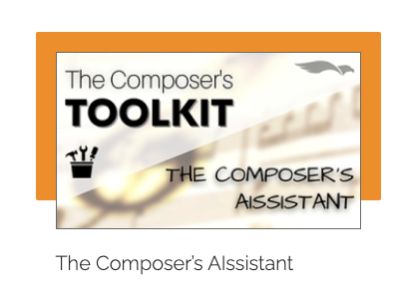Blackster
Senior Member
Hi guys,
I'm thrilled to share with you "The Composer's AIssistant"!
It's a collection of the best prompts for composers, musicians, and producers I've come across so far.
Use AI (ChatGPT) to ...
And here comes the surprising part ... it's free!
You can download the PDF (6 pages) inside the Composer's Toolkit.
------------------------------------------------
BUT ... if you want to see me implement the prompts and the follow-up conversations to tickle out all the good information from the AI, I invite you to look closer at the add-on below.
Here's what you'll get in the add-on for only 25€:
Get the Add-On NOW
I'm honest, if you're already an active ChatGPT-user, I believe you won't need the implementation video series, although there might be a lot of details in there that you would appreciate.
But if you're new to ChatGPT and want to see how you can get a shortcut to becoming more productive, this is perfect for you!
Once you start seeing the power of AI, you can't unsee it anymore!
Best always, and enjoy the rest of your day,
Frank
I'm thrilled to share with you "The Composer's AIssistant"!

It's a collection of the best prompts for composers, musicians, and producers I've come across so far.
Use AI (ChatGPT) to ...
- Access world-class information on music theory, composition techniques, orchestration, and instrumentation
- Streamline and organize your music creation process
- Stay ahead of any project or task by letting the AI become your personal expert on management and productivity
- Generate engaging text-based content for social media such as Facebook and Twitter to promote your music or service
And here comes the surprising part ... it's free!

You can download the PDF (6 pages) inside the Composer's Toolkit.
------------------------------------------------
BUT ... if you want to see me implement the prompts and the follow-up conversations to tickle out all the good information from the AI, I invite you to look closer at the add-on below.
Here's what you'll get in the add-on for only 25€:
- The Composer's AIssistant PDF (the same as the Composer's Toolkit)
- Video implementation of using the AI (4 videos, downloadable, 1h 30min. in total)
- All transcripts from the implementation videos (4 PDFs, 50 pages in total)
- A manual about how to get access to ChatGPT (PDF, 1 page)
Get the Add-On NOW
I'm honest, if you're already an active ChatGPT-user, I believe you won't need the implementation video series, although there might be a lot of details in there that you would appreciate.
But if you're new to ChatGPT and want to see how you can get a shortcut to becoming more productive, this is perfect for you!
Once you start seeing the power of AI, you can't unsee it anymore!

Best always, and enjoy the rest of your day,
Frank






